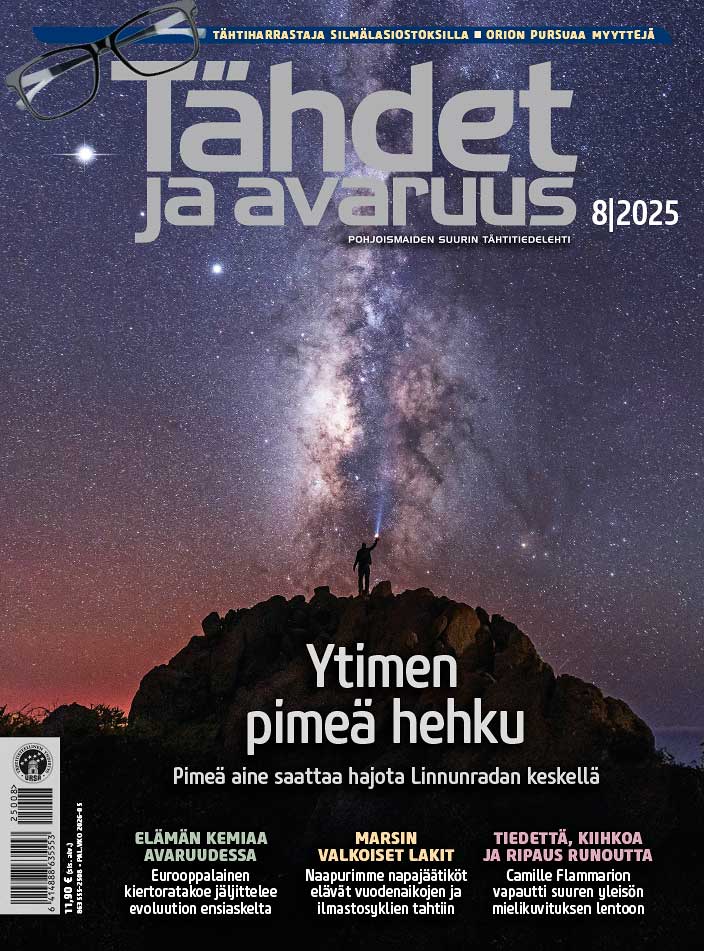Matti Helin
Muistat varmasti ne ensimmäiset kerrat kun katsoit tähtitaivasta. Se oli kenties kesämökin laiturilla jonain elokuisena yönä. Tai ehkäpä mummolan pihassa, joulukuisena iltayönä? Ihmettelit tuhansia tähtiä. Mitä ne ovat, miten ne ovat syntyneet, miksi ne loistavat… Kohta löysitkin itsesi kyselemästä tähdistä vanhemmiltasi, hakemalla tietoa yötaivaan kohteista kirjoista, opettelemalla tähdistöjen nimiä… Hiljalleen sinulle valkeni, kuinka suuri ja tuntematon avaruus onkaan. Mielesi täytti outo kaipuu, mysteeri, seikkailu.
Innostuksesi tuntui pohjattomalta. Luit kaikki kirjat mitä käsiisi sait. Seisoit yöt taivaan alla, etsien kiikareilla galakseja, tähtijoukkoja ja kaasusumuja. Tiedonnälkäsi kasvoi. Halusit kaukoputken, ei, ISON kaukoputken. Ja kameran. Tai kaksi.
Hiljalleen opit lähes kaiken mitä avaruudesta tiedetään. Tähdet ovat valtaisia plasmapalloja, joita kiertää planeettoja. Näitä aurinkokuntia on (kosmisessa mittakaavassa) lähellä toisiaan miljardeja ja nämä yhdessä muodostavat linnunradan. Tällaisia linnunratoja taasen on miljardeja ja taas miljardeja.
Hiljalleen avaruus alkoi muistuttaa luetteloa. A-spektriluokan tähti, emissiosumu, kraateri, sauvaspiraali, supernovajäänne… Nämähän on nähty. Maailmankaikkeus tuntui pienenevän mielessäsi. Hiljalleen kaukoputki alkoi jäämään yhä useammin talliinsa.
Kuulostaako tutulta? Kenties, avaruus on meille liian itsestäänselvä. Halumme oppia ja tietää on kenties sysännyt syrjään sen kipinän, mikä aikanaan sai meidät kiinnostumaan avaruudesta.
Kenties?
Pitäisikin aina välillä muistaa pysähtyä ja palauttaa mieleen ne tunteet, joita taivaan katselu silloin joskus miessämme synnytti. Se outous, suuruus, mystisyyt, kenties pelonsekainen kunnioitus? Kohdata se, jota et tunne. Ja ymmärtää, että vaikka meistä välillä tuntuukin, että tiedämme paljon, tiedämmekö kuitenkaan koskaan tarpeeksi?
Ja voisiko se olla hyvä niin?
“…And here are trees and I know their gnarled surface, water and I feel its taste. These scents of grass and stars at night, certain evenings when the heart relaxes—how shall I negate this world whose power and strength I feel? Yet all the knowledge on earth will give me nothing to assure me that this world is mine. You describe it to me and you teach me to classify it. You enumerate its laws and in my thirst for knowledge I admit that they are true. You take apart its mechanism and my hope increases. At the final stage you teach me that this wondrous and multicolored universe can be reduced to the atom and that the atom itself can be reduced to the electron. All this is good and I wait for you to continue.
But you tell me of an invisible planetary system in which electrons gravitate around a nucleus. You explain this world to me with an image. I realize then that you have been reduced to poetry: I shall never know. Have I the time to become indignant? You have already changed theories. So that science that was to teach me everything ends up in a hypothesis, that lucidity founders in metaphor, that uncertainty is resolved in a work of art. What need had I of so many efforts? The soft lines of these hills and the hand of evening on this troubled heart teach me much more.
I have returned to my beginning. I realize that if through science I can seize phenomena and enumerate them, I cannot, for all that, apprehend the world. Were I to trace its entire relief with my finger, I should not know any more. And you give me the choice between a description that is sure but that teaches me nothing and hypotheses that claim to teach me but that are not sure. A stranger to myself and to the world, armed solely with a thought that negates itself as soon as it asserts, what is this condition in which I can have peace only by refusing to know and to live, in which the appetite for conquest bumps into walls that defy its assaults?
To will is to stir up paradoxes. Everything is ordered in such a way as to bring into being that poisoned peace produced by thoughtlessness, lack of heart, or fatal renunciations.”
― Albert Camus, The Myth of Sisyphus and Other Essays

